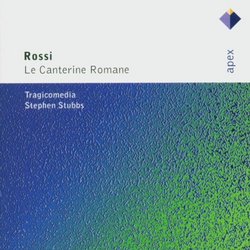| All Artists: Rossi, Stubbs, Tragicomedia Title: Rossi: Le Canterine Romane Members Wishing: 0 Total Copies: 0 Label: Wea Apex Classics UK Original Release Date: 1/1/2006 Re-Release Date: 5/30/2006 Album Type: Import Genre: Classical Style: Number of Discs: 1 SwapaCD Credits: 1 UPC: 825646178223 |
Search - Rossi, Stubbs, Tragicomedia :: Rossi: Le Canterine Romane
 | Rossi, Stubbs, Tragicomedia Rossi: Le Canterine Romane Genre: Classical
|
Larger Image |
CD Details |
CD ReviewsBaroque Andrews Sisters? Giordano Bruno | Wherever I am, I am. | 07/28/2009 (5 out of 5 stars) "Honk if you're old enough to remember the Andrews Sisters. If not, perhaps the Shirelles will ring your bells. Being 461 years old this year, ah how well I remember the trio of court ladies who sang for the Estes in Ferrara, the ravishing polyphonic madrigals of Luzzasco Luzzaschi, and their even more artful successors, the trio of sisters who delighted Mantua in the decades before and after my supposed auto da fe in Rome. The jewel of that ensemble was of course Andreana Basile, the Siren of Posilipo, for whom every bravo of Mantua languished. Andreana, as I recall, had two daughters in mantua - Leonora and Caterina - both of them beautiful of face and voice. Mother and daughters took up residence in Rome in 1633, with Barberini papal patronage, and performed until the death of Urban VIII in 1644 as "Le Canterine Romane". Naturally every poet and composer of the Eternal City was infatuated with one or all of them, including the quaint Englishman John Milton, who wrote sonnets to them in Latin. Banished from barbaric post-Barberini Rome, Le Canterine fled to Paris along with the Neapolitan Luigi Rossi, the most acclaimed composer of his age, more than 300 of whose cantatas have survived because of their Europe-wide distribution. At least 60 of those cantatas were written explicitly for the mother-daughters trio, who artfully accompanied their own singing on harp, lira, theorbo, guitar and/or gamba. Leonora, the most artful of all, survived her mother and sister by three decades; her sculpted tomb can still be visited in the Church of Santa maria della Scala, before which I, even I the most famous of heretics, place flowers once a year.
Tragicomedia, directed by lutenist Stephen Stubbs, has brilliantly resurrected the sounds of Le Canterine Romane in this recording of cantatas and instrumental fantasies by Luigi Rossi. The singers are Barbara Borden, Suzie Le Blanc, Emily Van Evera, all sopranos, and Päivi Järviö, mezzo-soprano. The instrumentalists and continuoists are Stubbs on guitar and chitarrone, Andrew Lawrrence-King on double harp and keyboards, and Erin Headley on gamba and lirone. There's no way to appreciate the excitement they generate together except to hear the whole performance.'' Rossi is more than a minor composer rediscovered. These pieces are intensely affective and distinctly original, particularly the dramatic dialogue "Noi siam tre donzellette semplicette" -- "We Are Three Innocent Maidens" -- which is almost a mini-commedia dell'opera. The wiles and follies of male admirers are the subject the three maidens celebrate in song, wittily, flirtatiously, scornfully, charmingly. Le Canterine were plainly boudoir feminists. The 11-minute cantata "Infelice Pensier" for two sopranos without continuo - sung by Borden and Van Evera - is as subtle a display of ornamental virtuosity as any Baroque duet I've ever heard. This, amici miei, is a recording for the ages, a musical 'transmigration' of souls." |

 Track Listings (17) - Disc #1
Track Listings (17) - Disc #1